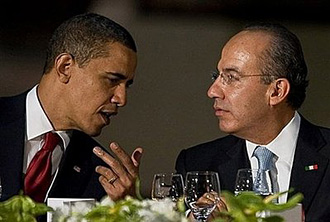
|  |  |  Editorials | Issues | August 2009 Editorials | Issues | August 2009  
Mexico Rebuffs Charges of Abuse by Army in Drug War
 Mica Rosenberg - Reuters Mica Rosenberg - Reuters
go to original
August 06, 2009


| | Mexican President Felipe Calderon (R) listens to US president Barack Obama during a meeting in April 2009. Mexican drug trafficking joins swine flu and climate change on a packed agenda of talks between North American leaders in Mexico this weekend, under the shadow of the closely-tied neighbors' economic woes. (AFP/File/Ronaldo Schemidt) |  |
Mexico City - Mexico on Thursday defended its army-led war on drug cartels against accusations of human rights abuses that could hold up millions of dollars of U.S. aid, saying any violations were isolated incidents.

"The Mexican government recognizes that occasionally, in an isolated manner, there have been situations that you could qualify as abuses of authority, abuses of power, violations of human rights," Foreign Minister Patricia Espinosa told a news conference.

"The Mexican army has acted correctly in its fight against organized crime," Espinosa said.

Mexico's human rights commission has documented cases of soldiers arbitrarily detaining drug suspects, sometimes beating and torturing them with electric shocks.

U.S. Senator Patrick Leahy, the Democratic head of the Appropriations Committee, said Mexico had not yet met human rights requirements needed for the release of 15 percent of a $1.4 billion anti-drug aid package known as the Merida Initiative.

His stance could delay the aid, which will likely be a contentious issue at a summit of the leaders of Mexico, the United States and Canada in the Mexican city of Guadalajara starting on Sunday.

President Felipe Calderon has deployed tens of thousands of troops and federal police to fight heavily armed drug smugglers. The onslaught has failed to curb violence, with about 4,000 people killed this year, sometimes in gruesome decapitations.

Human Rights Watch says soldiers suspected of abuses are tried in military courts, which rarely dole out stringent punishments for violations as serious as rape or murder.

"All the evidence suggests that serious atrocities committed by the army in Mexico ... are not isolated. The number of complaints before the national human rights commission has multiplied, there are hundreds of cases," Jose Miguel Vivanco, head of Human Rights Watch's Americas division, told Reuters.

(Editing by Peter Cooney) |

 |
|  |



